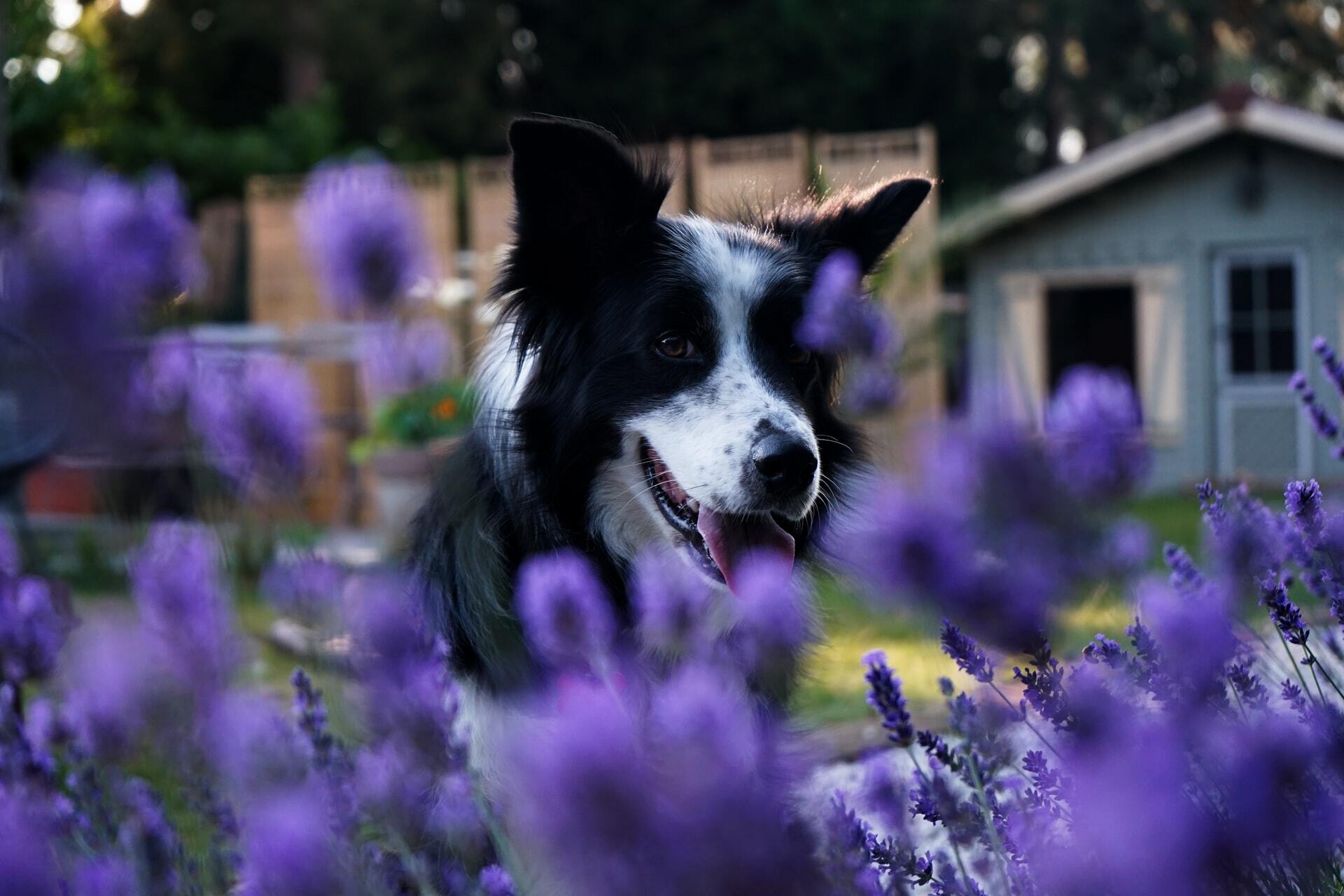What plants are toxic to dogs?

Spring is just around the corner and with it comes beautiful blooming flowers, plants, fruit, and vegetable gardens. While these plants can add color and wonderful aromas to your home and yard, they can also bring danger to your pet. So, before you bring that new puppy or kitten home, before you start that landscaping project, or purchase a new indoor plant, take a few minutes to look at this list of toxic and non-toxic plants to ensure your fur baby is safe.
Are you concerned about your pet?
Book a video consultation with an experienced veterinarian within minutes.
- Professional vet advice online
- Low-cost video vet consultations
- Open 24 hours a day, 365 days a year
Sago Palm
The sago palm (Cycas revoluta) is a popular houseplant found in warmer climates and known for its feathery foliage and ease of care. Unfortunately, every part of this plant is toxic, with the seed being the most toxic portion. It takes very little to cause GI upset as well as significant damage to the liver. If not treated quickly, it can even cause death.
Treatment generally consists of aggressive hospitalized care that includes inducing vomiting, administering activated charcoal, providing intravenous fluids, administering liver and GI protectants, as well as monitoring liver enzymes and blood clotting ability for a minimum of 48 hours.
Succulents
Luckily, most succulents are considered non-toxic and are harmless to pets when ingested. Others contain skin irritants that can cause minor skin irritations, and some can cause mild symptoms when ingested. But there are a few succulents that can be fatal when ingested in large quantities.
1. Aloe Vera
Toxic to dogs, cats, horses
Although known for its many medicinal and beneficial properties to humans, aloe vera is toxic to both cats and dogs when ingested. Saponin, a chemical in aloe, is the main toxin that can cause serious problems in your pet’s system.
Clinical symptoms of poisoning:
- abdominal pain
- diarrhea
- nausea
- vomiting
- skin irritation
- lethargy
- tremors
2. Euphorbia Milii (Crown of Thorns)
Toxic to dogs, humans
The white, milky sap of the plant, referred to as latex, contains the strongest amount of toxicity, but any part of the plant can cause irritation. The plant is irritating to the skin and poisonous when eaten. Take necessary precautions when handling these plants. The sap that oozes from a broken stem or leaves can cause skin irritation.
Clinical symptoms of poisoning:
- nausea, vomiting, and diarrhea when ingested
- skin irritation, dermatitis from skin contact
- Dogs may also experience blistering and swelling around the eyes and mouth area.

3. Euphorbia Tiruacalli (Firestick, Pencil Tree Plant, Pencil Cactus)
Toxic to dogs, cats, horses
The main irritant is the sap from the plant.
Clinical symptoms include:
- mild irritation to the mouth and stomach
- may cause vomiting
- symptoms are often mild and not severe
4. Kalanchoes (Panda Plant, Mother of Thousands, Mother of Millions, Devil’s Backbone, Chandelier Plant)
Toxic to cats, dogs, and other wildlife
These plants can contain bufadienolides cardiac glycosides. Some contain a toxic steroid known as daigremontianin.
Clinical symptoms of poisoning:
- irregular heartbeats
- severe weakness
- abnormal heart rhythm
- vomiting
- diarrhea
- tremors
- seizures
- collapse
5. Crassula Ovata-Jade Plant (aka money tree, lucky plant, or friendship tree)
Toxic to dogs and cats
It is unknown what substance makes jade plants toxic.
Clinical symptoms of poisoning include:
vomiting
depression
incoordination
lethargy
6. Crassula Arborescens (Silver Jade Plant, Chinese Jade, Money Plant)
Toxic to dogs and cats
The toxic substance is unknown.
Clinical symptoms include:
- nausea
- vomiting
7. Sansevieria Trifasciata (Snake Plant, Mother-In-Law’s Tongue)
Toxic to cats and dogs
The chemical compound in snake plants that can cause irritation is saponin.
Clinical symptoms of poisoning:
- nausea
- vomiting
- diarrhea
8. Senecio Rowleyanus (String of Pearls, String of Peas Plant)
Toxic to dogs, cats, other pets
The plant’s sap can cause dermatitis or skin irritation in humans and pets.
Clinical symptoms include:
- vomiting
- diarrhea
- drooling
- lethargy

Herbs
1. Chamomile
While chamomile is safe in products for dogs, you want to avoid your dog's contact with the actual plant.
Clinical symptoms of poisoning:
- contact dermatitis
- vomiting
- diarrhea
- anorexia
- allergic reactions
- bleeding tendencies (long-term use)
2. Chives
This herb is in the Allium family, such as onions, and can be quite harmful to dogs when ingested. While they can tolerate low doses (as you'll find some flavoring in dog treats), it is best to avoid these plentiful herbs whenever possible.
Clinical symptoms of poisoning:
- drooling
- nausea
- oral irritation
- vomiting
- diarrhea
- lethargy
- abdominal pain
- elevated heart rate and respiratory rate
- weakness
- exercise intolerance
- collapse
- pale gums
3. Garlic
Toxic to dogs and especially cats. Garlic is in the Allium family.
Clinical symptoms of poisoning:
- drooling
- nausea
- oral irritation
- vomiting
- diarrhea
- lethargy
- abdominal pain
- elevated heart rate and respiratory rate
- weakness
- exercise intolerance
- collapse
- pale gums
4. Hops
Keep any home-brewing materials and leftovers safely contained - hops can be hazardous whether fresh, dried, or cooked (spent hops), with dried hops being the most toxic form. Toxic effects can be very severe.
Clinical symptoms of poisoning:
- panting
- high body temperature
- seizures
- death
5. Leeks
Another member of the Allium family. They can cause some very uncomfortable symptoms for dogs.
Clinical symptoms of poisoning:
- drooling
- nausea
- oral irritation
- vomiting
- diarrhea
- lethargy
- abdominal pain
- elevated heart rate and respiratory rate
- weakness
- exercise intolerance
- collapse
- pale gums

6. Marijuana
Symptoms of marijuana ingestion can be mild to moderate, and even include death.
Clinical symptoms of poisoning:
- prolonged depression
- vomiting
- incoordination
- sleepiness or excitation
- hypersalivation
- dilated pupils
- low blood pressure
- low body temperature
- seizure
- coma
- death (rare)
7. Onions & Shallots
Toxic to dogs, and cats are even more susceptible to toxic effects.
Clinical symptoms of poisoning:
- Drooling
- Nausea
- oral irritation
- vomiting
- diarrhea
- lethargy
- abdominal pain
- elevated heart rate and respiratory rate
- weakness
- exercise intolerance
- collapse
- pale gums
- internal bleeding
8. Rhubarb
The leaves (and less so, stalks) contain oxalate crystals, which can wreak havoc with your dog's urinary tract.
Clinical symptoms of poisoning:
- Drooling
- loss of appetite
- vomiting
- diarrhea
- lethargy
- weakness
- tremors
- blood in urine
- changes to thirst and urination
9. Tomato Plants
A member of the nightshade family, tomato vines, and leaves can cause some worrying symptoms in pets.
Clinical symptoms of poisoning:
- hypersalivation (drooling)
- inappetence
- severe gastrointestinal upset
- diarrhea
- drowsiness
- CNS depression
- Confusion
- behavioral change
- weakness
- dilated pupils
- slow heart rate

Additional Toxic Plants & Symptoms of Poisoning in Dogs
1. Alocasia aka Elephant Ear: mouth irritation, pain, swelling of the mouth/lips/tongue, vomiting, drooling
2. American Holly: vomiting and diarrhea
3. Apricot seed kernels: vomiting, diarrhea, potential GI obstruction; may see brick red gums, dilated pupils, and labored breathing if large amounts are ingested
4. Arum Lily aka Calla Lily or Pig Lily: mouth irritation, pain, swelling of the mouth/lips/tongue, vomiting, drooling
5. Asparagus Fern: vomiting, diarrhea, skin irritation
6. Azalea: vomiting, diarrhea, weakness, abnormal heartbeats, heart failure, seizures, potentially fatal
7. Begonia (most toxic part is underground): mouth irritation, pain, swelling of the mouth/lips/tongue, vomiting, drooling
8. Cherry seeds, stems, and leaves: vomiting, diarrhea, potential stomach/intestinal obstruction; may see brick red gums, dilated pupils; and labored breathing if large amounts are eaten
9. Dieffenbachia: mouth irritation, pain, swelling of the mouth/lips/tongue, vomiting, drooling
10. Lily of the Valley: vomiting, diarrhea, abnormal heartbeat, lethargy, tremors, seizures, dilated pupils, potentially fatal
11. Mango seed kernels: vomiting, diarrhea, potential GI obstruction; may see brick red gums, dilated pupils, and labored breathing if large amounts are ingested
12. Milkweed: vomiting, diarrhea, labored breathing, dilated pupils; kidney and liver failure if large amounts are ingested
13. Oleander: drooling, abdominal pain, diarrhea, weakness, abnormal heartbeat, possibly fatal
14. Peach seed kernels: vomiting, diarrhea, potential GI obstruction; may see brick red gums, dilated pupils, and labored breathing if large amounts are eaten
15. Philodendron: mouth irritation, pain, swelling of the mouth/lips/tongue, vomiting, drooling
16. Tulips: vomiting, diarrhea, drooling, depression, abnormal heartbeat, tremors, panting, potentially fatal
For more information, please see the ASPCA comprehensive plant list, including pictures of toxic and non-toxic plants.
Read More:
7 Lesser-Known Foods That Are Toxic to Dogs
An Update on Grape and Raisin Toxicity in Dogs
Are Poinsettia’s Really Toxic to Dogs and Cats?
Need to speak with a veterinarian regarding your dog and poisonous plants or another condition?
Click here to schedule a video consult to speak to one of our vets. You can also download the FirstVet app from the Apple App Store and Google Play Stores.
More articles about Dog
Are you concerned about your pet?
Book a video consultation with an experienced veterinarian within minutes.